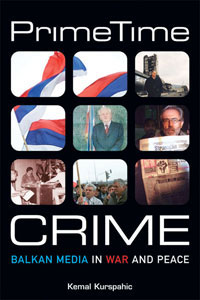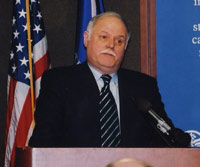Prime Time Crime: The Media and the Balkan Wars
Did the media play an active role in the creation of Yugoslav dictator Slobodan Milosevic and fan the flames of ethnic hatred that plunged the Balkans into a decade of bloody ethnic conflict? How can the international community foster independent media voices in situations of ethnic and religious conflict?

After the fall of the Iron Curtain, the flames of war in the Balkans were fanned by newspapers and electronic media controlled by ultra-nationalist governments. How can the international community foster independent media voices in situations of ethnic and religious conflict? What lessons have been learned from efforts to promote non-nationalist media in post-conflict environments and in societies undergoing transitions to democracy in regions such as the Balkans?
On March 4, 2003 the U.S. Institute of Peace held a briefing to explore the lessons from this Balkan catastrophe as described in Prime Time Crime: Balkan Media in War and Peace—a new book by award winning journalist and former Institute senior fellow Kemal Kurspahic. Co-moderated by Balkans expert and Institute executive vice president Harriet Hentges and Fellowship Program director Joseph Klaits, the briefing featured Roy Gutman, current Institute senior fellow and chief diplomatic correspondent for Newsweek; director of the Institute's Special Initiative on the Muslim World and former U.S. ambassador to Bosnia-Herzegovina Richard Kauzlarich; and Sanford Ungar, president of Goucher College and former director of the Voice of America.
Present at the Creation: The Media as a Midwife to the Birth of a Dictator
Did the media play an active role in the creation of Yugoslav dictator Slobodan Milosevic and fan the flames of ethnic hatred that plunged the Balkans into a decade of bloody ethnic conflict?
Kemal Kurspahic explained that during the Cold War, Balkan media propagated the ideas of a "one man/one party" regime: the Tito government.
According to Kemal Kurspahic, former editor-in-chief of the Sarajevo daily Oslobodjenje in his newly published book Prime Time Crime, the rise of nationalistic media throughout the Balkans in the 1990s in many ways served as a midwife to the birth of the Milosevic regime. Noting that it was important to remember that not all journalists in the Balkans fell pray to the call of nationalist extremism, Kurspahic pointed out that many journalists died in Bosnia and throughout the Balkans trying to uphold the ideals of independent journalism.
Discussing the interplay between nationalism, ethnic strife, and the media in the Balkan wars of the 1990s, Kurspahic outlined three primary lessons for the international community:
- The importance of the role of the media in both conflict and keeping the peace must not be underestimated.
In his research, Kurspahic found that the media played a major role in propagating ethnic tensions in the Balkans over the past decade, but he noted that the Dayton Accords virtually ignored state-society-press issues. This, he cautioned, was a costly mistake that the international community should avoid in efforts to bring peace to other zones of conflict around the globe. - The media can be a powerful tool for both ethnic "balkanization" and reconciliation.
Although many media outlets in the Balkans transformed from preaching unity during the Tito era to propagating ethnic and nationalistic "hate" in the '90s, the press in the Balkans has proven itself equally effective as a tool of inter-ethnic reconciliation, when encouraged to do so. - The audience for good journalism transcends ethnic boundaries.
Building upon his previous point, Kuspahic stressed that to combat nationalistic and ethnic separatist voices in the media, the international community needed to support independent media organizations that seek to reach beyond ethno-political lines. "Much of the intervention [by the international community]," he noted, "has been based on the assumption that members of the Balkans don't 'speak the same languages.'"
In closing, Kurspahic cautioned that ethnic tensions in zones of conflict cannot be effectively combated by the international community using ethnocentric responses. "A lot of money was invested in using the media to function [in the Balkans] in the three different languages. I think we are still paying the price for that and we've contributed to a type of apartheid solution."
Watching the Watchdogs
 Starting off with some reflections on his time working in the Balkans, Pulitzer Prize-winning journalist Roy Gutman, noted that Kurspahic's analysis captured a "rich tapestry of some of the most awful practices of contemporary journalism." In fact, Gutman stated, perhaps one of the most troubling aspects about the role the Balkan press played in conflict over the past decade was how easily members of the press moved from journalists to propagandists. This created a situation where the line between some Balkan journalists and Milosevic's official "propagandists" was indistinguishable at times.
Starting off with some reflections on his time working in the Balkans, Pulitzer Prize-winning journalist Roy Gutman, noted that Kurspahic's analysis captured a "rich tapestry of some of the most awful practices of contemporary journalism." In fact, Gutman stated, perhaps one of the most troubling aspects about the role the Balkan press played in conflict over the past decade was how easily members of the press moved from journalists to propagandists. This created a situation where the line between some Balkan journalists and Milosevic's official "propagandists" was indistinguishable at times.
While Gutman cautioned that many professional journalists have some experience with "covering the little lies" espoused by the state at some time during their career, the stories that came out of many Balkan media outlets were beyond inaccurate and indeed at times were the inverse of the actual truth. Regretfully, Gutman lamented, the international press was slow to realize this fact and thereby was unable to cover this problem adequately in the West.
Looking ahead, Gutman pointed out that the media (both domestic and international) must guard for and speak out against such abuses of the power of the press elsewhere. "Watchdogs," he reminded, "can turn into lapdogs...even the watchdogs need watching."
The Rise of Nationalist Media and the Price of Inaction in the Balkans
What lessons can the international community take from the influence of nationalist media in the onslaught of ethnic violence that consumed that Balkans in the '90s? Former U.S. ambassador to Bosnia-Herzegovina Richard Kauzlarich examined the international community's work to manage and combat ethnic conflict in the Balkans and suggested three main lessons for policymakers:
- Don't count on dictators to implement democratic reforms or to act as effective peacemakers.
- "Wait and see" is a risky approach in such environments. While intervention is best done early, lack of early action should not be used as an excuse for complete inaction.
- To combat the impact of media infused with extreme nationalistic or ethnocentric propaganda, the international community must facilitate the growth of independent media that is seen as a credible alternative by the local populations. Local legitimacy and quality, in the eyes of the international community, are far from the same.
On how the international community could better respond to the interplay between local media and ethnic strife in zones of conflict, Kauzlarich offered three suggestions.
- Donor strategies must be refocused to provide more seed funding to help independent media outlets get themselves off the ground and enough time to develop an audience.
- The international community should assist independent media start-ups in market development and coordinate lending strategies so as not to saturate markets with more media outlets than the area can support.
- International donors need to work with media start-ups to develop business plans and strategies that are sustainable over the long term and will provide sufficient revenue for operations without dependence on state assistance.
"There has to be a more flexible approach [by the international community]," Kauzlarich suggested in summary. "A lot of very talented journalists were there [in Bosnia]. The problem was the [lack of] money and other support."
Making Media Work: Facilitating Independent Media Development in Transitional Societies
Speaking from his experience as director of the Voice of America, Sanford Ungar pointed out that the question of what role the media should play in covering any war is a tricky proposition anywhere—let alone in zones of conflict. In fact, Unger argued, the dilemma of whether the proper role of journalists in covering conflict is to question and critique or simply to "impartially" cover has plagued journalists on both a professional and personal level for ages. However, he stressed that while this ethical debate was inherently healthy, there were lines of professional ethics that journalists must adhere to, and the press must be vigilant in policing itself on such issues.
In closing, Unger noted that the international community in fostering the development of independent media and good journalistic practices in zones of conflict must be careful not to overstep. Working with non-governmental organizations and encouraging established media outlets in the West such as CNN and others to share best practices and help train new journalists could be a useful tool in combating the types of media abuses seen in the former Yugoslavia. Indeed, he suggested, the potential for members of the press to help their "brothers and sisters" abroad might hold the most potential, as government sponsored organizations such as the Voice of America (VOA) can carry unwanted luggage. "Inevitably, try as one might to do the best job," Unger noted from his experience at VOA, "there is a limit to how much instruction, example, and lecturing people [overseas] are willing to take from the United States government."
This USIPeace Briefing reflects the presentations and comments from "Prime Time Crime: The Media and the Balkan Wars"--a Current Issues Briefing held at the U.S. Institute of Peace March 4, 2003. The views summarized above reflect the discussion at the meeting; they do not represent formal positions taken by the Institute, which does not advocate specific policies.
The United States Institute of Peace is an independent, nonpartisan institution established and funded by Congress. Its goals are to help prevent and resolve violent international conflicts, promote post-conflict stability and development, and increase conflict management capacity, tools, and intellectual capital worldwide. The Institute does this by empowering others with knowledge, skills, and resources, as well as by directly engaging in peacebuilding efforts around the globe.





